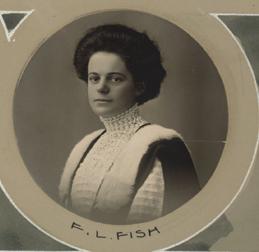Frances Lillian Fish: Difference between revisions
(Created page with " thumb|right|Frances Fish, (ca. 1910). UNB Class Composite and Group Photographs Database.Frances Lillian Fish earned a First Class Honours degree i...") |
mNo edit summary |
||
| (3 intermediate revisions by one other user not shown) | |||
| Line 1: | Line 1: | ||
[[File:Frances Fish.jpeg|thumb|right|Frances Fish, (ca. 1910). UNB Class Composite and Group Photographs Database.]]Frances Lillian Fish earned a First Class Honours degree in [[Department of Classics and Ancient History|Classics]], [[Department of English|English]], and [[Department of Philosophy|Philosophy]] at UNB in 1910 and won the Montgomery-Campbell Prize in Classics in her junior and senior year. As a student, she shone socially and academically. Fish was President of the Ladies' Society, a member of the debating society, played basketball and took part in student dramatics. Armed with an MA from the University of Chicago, she entered the Dalhousie Law School in 1915. In 1918, she became the first woman to graduate with a law degree in Nova Scotia and to be admitted to the Nova Scotia bar. | |||
[[File: | |||
Fish returned to her native Newcastle having been called to the New Brunswick bar in 1934. In the 1935 provincial election, Fish ran as a Conservative, the first woman to run for any political party in the province. Although she lost her bid, she received the most votes of any of the four Conservative candidates. In 1947, Fish broke another gender barrier when she was appointed the first woman deputy magistrate in New Brunswick, for the county of Northumberland. Frances Fish died in Chatham on 27 October 1975. | Fish returned to her native Newcastle having been called to the New Brunswick bar in 1934. In the 1935 provincial election, Fish ran as a Conservative, the first woman to run for any political party in the province. Although she lost her bid, she received the most votes of any of the four Conservative candidates. In 1947, Fish broke another gender barrier when she was appointed the first woman deputy magistrate in New Brunswick, for the county of Northumberland. Frances Fish died in Chatham on 27 October 1975. | ||
'''Source(s):''' | '''Source(s):''' | ||
*''University Monthly'', vol. 30, no. 1, November 1910, p. 4. | |||
*''Prominent People of New Brunswick''. [New Brunswick]: The Biographical Society of Canada Ltd, 1937, p. 4c. | |||
*[[http://www.lib.unb.ca/archives/UNBComposites/ UNB Class Composite and Group Photographs Database]] | |||
{{Copyright}} | |||
[[Category:Notable Women at UNB|Frances Lillian]] | |||
Latest revision as of 12:59, 24 February 2021
Frances Lillian Fish earned a First Class Honours degree in Classics, English, and Philosophy at UNB in 1910 and won the Montgomery-Campbell Prize in Classics in her junior and senior year. As a student, she shone socially and academically. Fish was President of the Ladies' Society, a member of the debating society, played basketball and took part in student dramatics. Armed with an MA from the University of Chicago, she entered the Dalhousie Law School in 1915. In 1918, she became the first woman to graduate with a law degree in Nova Scotia and to be admitted to the Nova Scotia bar.
Fish returned to her native Newcastle having been called to the New Brunswick bar in 1934. In the 1935 provincial election, Fish ran as a Conservative, the first woman to run for any political party in the province. Although she lost her bid, she received the most votes of any of the four Conservative candidates. In 1947, Fish broke another gender barrier when she was appointed the first woman deputy magistrate in New Brunswick, for the county of Northumberland. Frances Fish died in Chatham on 27 October 1975.
Source(s):
- University Monthly, vol. 30, no. 1, November 1910, p. 4.
- Prominent People of New Brunswick. [New Brunswick]: The Biographical Society of Canada Ltd, 1937, p. 4c.
- [UNB Class Composite and Group Photographs Database]
© UNB Archives & Special Collections, 2014
